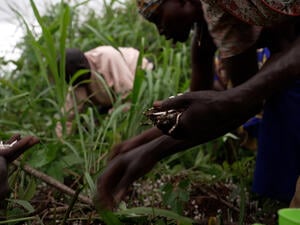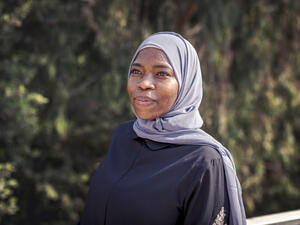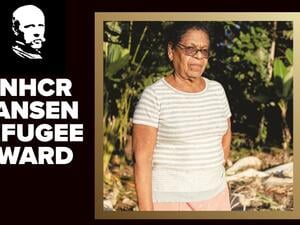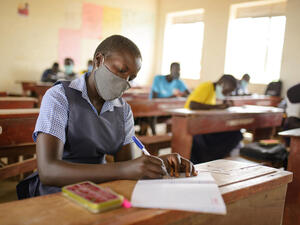DAFI helps refugee agronomist contribute to growth of Afghanistan
DAFI helps refugee agronomist contribute to growth of Afghanistan

Asadullah (right) pins up a map during a working group meeting in Afghanistan.
ISLAMABAD, Pakistan, February 26 (UNHCR) - Asadullah Salarzai thought his chances of becoming a qualified agronomist were over when his brother was killed in southern Afghanistan five years ago. His sibling, aid worker Hayatullah, was the family breadwinner when he was shot dead in the city of Kandahar.
At the time, Asadullah and most of his family were living in Toor refugee camp in northern Pakistan. His parents had fled to Pakistan in the early 1980s during the Soviet occupation of Afghanistan and ensuing civil war.
The 24-year-old was born in the camp and studied at a local school. By the time he reached his late teens, he knew that he wanted to study agriculture at university and then go to Afghanistan to help in the reconstruction of the conflict-battered country.
Then the family tragedy struck. The brother had regularly remitted money to the family in Pakistan, and some of this was used to fund Asadullah's education. "My dream of studying agriculture seemed to be over," he recalled.
But then he thought about the Albert Einstein German Academic Refugee Initiative, or DAFI, under which thousands of refugees - including his slain brother - have pursued a higher education. Funded by the German government and run by UNHCR, the programme aims to promote self-sufficiency among refugees and boost their chances of finding a durable solution.
Asadullah applied in 2006 and was given a grant to study for a bachelor's degree in agricultural entomology at universities in Faisalabad and Peshawar. He graduated three years later and now works in Afghanistan as a natural resources management officer for the UN Food and Agriculture Organization.
He visits villages in five northern provinces - Kabul, Kunduz, Badakhshan, Baghlan and Mazar-e-Sharif - and advises the farmers on the best agricultural techniques, particularly for pest control and cultivation of almonds, walnuts and pistachio trees. "I am really enjoying working for my own people and sharing my experience with them and giving them advice on how to better manage their crops," said Asadallah, who talked to UNHCR during a recent trip to Peshawar to visit his family.
Asadullah is one of more than 650 Afghan refugees in Pakistan who have benefitted from DAFI since the programme was set up in 1992. They were awarded scholarships to study a wide range of subjects for terms ranging from one to four years. Afghan refugees in Iran have also won DAFI scholarships.
And as Nasir Sahibzada, a UNHCR programme assistant in Peshawar, pointed out, "Some of the DAFI-assisted students are now serving in Afghanistan in key positions." He noted that DAFI students serve as a role model in the Afghan refugee community. "DAFI is a window of hope and a tool for change, peace and reconstruction," Sahibzada said.
Meanwhile, a grateful Asadullah is trying to give something back. Aware of how important the DAFI scholarship was in helping him achieve his goal of becoming an agricultural expert, Asadullah is paying to provide an education for two Afghan orphans living in Toor camp. One is studying for an economics degree at the University of Peshawar and the other is at a school near the camp.
There are more than 1.7 million registered Afghans still living in Pakistan. Some 3.5 million have returned home with UNHCR help since 2002. Asadullah hopes to one day take his own family back to their native village in Kunduz, but Pakistan - the place where he was born and bred - will always have a special place in his heart.
By Rabia Ali in Peshawar, Pakistan








